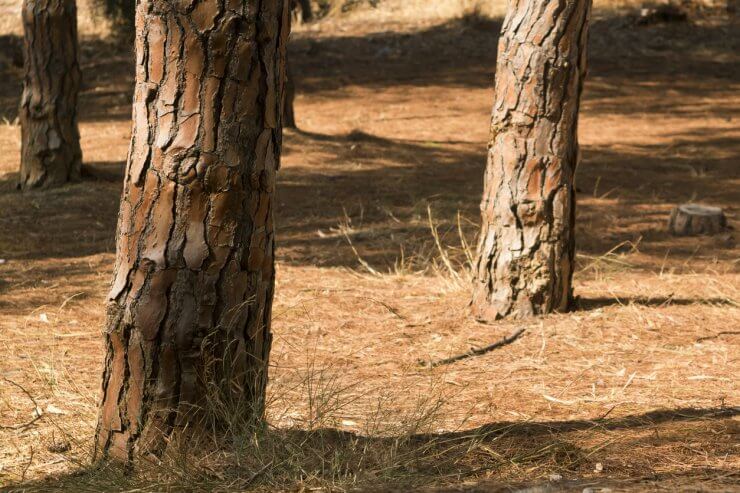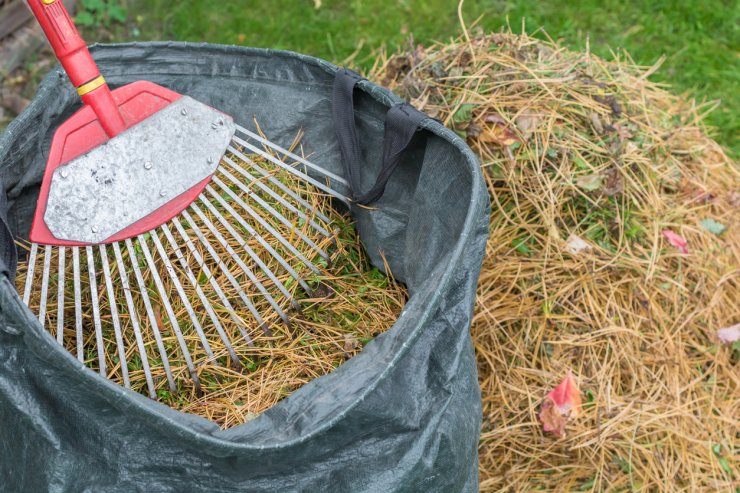
Pine needle compost might be one of the most misunderstood areas of composting. Sure, there’s some confusion about whether that take-out container is compostable, but when it comes to pine needles, there’s a longstanding assumption that they are too acidic.
Granted, that assumption is not without reason. At our cabin in Vermont where we spend our summers, I’ve had trouble starting a garden in parts of my yard because the pine needles just rain down constantly from June through September. They make great mulch but work a little too well. There’s a difference between purposefully using pine needles as mulch and covering your garden in blankets of pine needles every day.
And if you’ve spent much time in a pine forest, you know that there isn’t a lot of undergrowth in these areas. Therefore, the reasoning goes, is that the soil is too acidic for anything to grow. Really, I think it’s because pine needles are solid mulch, not because they kill everything in their path.
The soil around pine trees is indeed acidic, but that’s because they enjoy acidic growing environments. Additionally, evergreen roots tend to run on the shallow side, meaning there’s more competition for other plants to establish themselves. And because these trees are evergreen and usually don’t allow a lot of light to get through the canopy, it’s just not a great place for other flora.
So now that we’ve debunked that myth, let’s talk about whether or not you can use pine needle compost in your vegetable garden.
Discover 7 top tips for growing, harvesting, and enjoying tomatoes from your home garden—when you access the FREE guide The Best Way to Grow Tomatoes, right now!

Using pine needle compost in your garden: Yes or no?
First off, yes, pine needles are acidic. And if you used pine needle compost exclusively, it might be too much for your veggies. But pine needles have some wonderful benefits for your garden, including as a compost ingredient.
Before you think about composting them, however, I should point out that pine needles make superb mulch, like I said before. Like most any other mulch, they improve moisture retention in your soil, stabilize soil temperature, help control weeds, and they break down slowly, so you won’t need to mulch as often.
For pine needle compost, it’s that last item that you need to be aware of. The waxy coating on the needles, known as a cuticle, makes it difficult for microorganisms to do their decomposition work. You can speed up the process somewhat by waiting until the needles are dry before you rake them up and add them to your compost heap. You can also shred them by running over them with your mower.
What this all means is that if you add pine needles to your compost bin, they may still be partially intact while the rest of your compost is ready to go. But do you need to worry about that lowering the pH of your soil?
The truth about pine needles in your compost
Even though pine needles are acidic, as they break down, they lose some of that acidity and may even approach a neutral pH.
Amy Jo Detweiler, extension horticulturist at Oregon State University, says that as long as you limit the pine needles to about ten percent of your compost pile, they are unlikely to have much impact on the acidity of your garden soil.
Ultimately, whether you need mulch or compost, pine needles are a great (and FREE!) source of materials. Just don’t overdo it.
Have you used pine needles in your compost? How do you think it impacted your plants? I’d love to hear your story in the comments.
Discover 7 top tips for growing, harvesting, and enjoying tomatoes from your home garden—when you access the FREE guide The Best Way to Grow Tomatoes, right now!





Hi. I was interested in your article, but my experience has been the opposite and a terrible one. I mulched my tomatoes, peppers and an eggplant with pine mulch. They started dying almost immediately. The new plants I bought after ripping those out also died. I thought there must be some other cause besides the pin, even though the timing was suspicious, however, all the plants were already up mulch. Like peas, lettuce herbs all of those are fine. Plants are fine and the weeds are growing faster than I can keep up with. But the tomatoes and peppers survivors are completely stunted and no weeds grow near them, even though i removed the pine needles a few weeks ago.
Any ideas? Could the feed store have sold me poisoned pine needles?
Here in Maine I’ve used dry white pine needles as mulch for several years. They seem to work very well. They are an improvement over any other mulch I have tried, And, of course, they are abundant and free.
I use pine needles as mulch but never near my house. It is one of the most flammable mulches (vs wood chips, etc) so here in Southern CA, I use it very carefully – away from any shed, house or other structures in case a wild fire comes through.
10 acres of high mountain desert. 3 evergreen trees. Yup I know pine straw makes the garden look neater. It does eventually break down but it isn’t quick. PH is in the 7s here. A hint of acid won’t hurt a bit. In fact a hint more acid would be good for the tomatoes and strawberries. I add just a pinch of Sulphur to those beds. The blueberry area is sulphured a bit more and pine straw added hoping it will help. I use cardboard on my walkways between garden rows. It keeps my shoes out of the clay and it does compost into the soil when used as a cover to stop weed growth. If I had more needles available I’d use then on my paths also. As it is the needles are mixed with grass and leaves and used as mulch for strawberries and lighter applications around the tomatoes. Mulch helps hold moisture. It is hot summer desert so mulch is important. Poor soil because of sparse weeds even to decompose and build top soil. Mulch and compost help with building up good soil. Pine straw is considered gold for the garden. I also mulch roses with pine straw as the top dressing over leaves and grass clippings to help hold in moisture while slowly building the soil.
No I don’t grow a lot of grass on the desert but the two little patches are pretty and help build up the soil where ever I can add the clippings. I bought a leaf blower/ mulcher. Meaning it will vacuum up leaves and grind them before blowing them back out. It is great for pine needles too.
What about Douglas Fir needles.
Such great input! Thank you all from an amateur…always needing schooling. I have a huuuggggee blue pine in my front yard and pine needles so deep it’s like walking on a deep pile carpet… yep…nothing will grow except wee pinecones…ha ha ha…however…I never thought about using it for mulch or adding it to my compost…thanks again!
We have lived in central Florida for over fifty years and pine needles have been a useful ground cover. The article and research is correct. Too much keeps anything from growing except insects and our best friends, the black snakes. We have been mixing the pinestraw with other clippings and find that the mulch works great. Mix the straw with green grass clippings and leaves off the cherry bushes works well. Here’s a cool point about pinestraw. When the straw gets real thick I roll it back like a rug, shovel up a bucket of the black, rich soil under it for planting new seeds or cuttings then roll the needles back in place. I have so much pinestraw mulch I share it with neighbors.
Great information. We just moved to Ocala and I’m thinking that pine needles could be good to collect for helping apply to the sand along with some other organic material to complement the sand for a vegetable garden. I need something inexpensive to slow water seepage and allow the Florida sand “soil” to keep moist for plant growth.
I live in semi-arid Colorado and my soils have a pH between 8 and 9. Acid needles from the pine tree in my back yard are a much cheaper way to neutralize that pH then constantly adding store-bought ammonium sulfate.
My pine needles are black from years of being buried under newer needles that naturally fall from ponderosa pine.they crumble easily in your hand. Will veggies grow OK in them.my soil is clay so I added the needles in trenches 12 inches deep.should I add soil before planting?
I use pine needles as a ground cover for walkways and blueberries. Its free cause I sweep it off of local sidewalks and street corners which increases safety for the many bikes and pedestrians that use the area. Those same bikes and pedestrians break the needles up walking and riding over them so I do get some “powdered” stuff which seems to provide good cover as well but break up more easily. Lots of material here in the northwest.
Using pine needles, aka pine straw, is a frequently used mulch in the South. It does inhibit growth if used too thick. Also, snakes like to hide in it and copperheads have the same coloring, so don’t put it near walkways. According to several sources I looked at the “acidity” is not even enough to change the color of hydrangeas so I don’t think one would need to add lime.
When I put pine needles in my compost pile, I mix up a bucket of lime water and pour it over top of the needled to offset the acidity.
Never even thought of using them as a mulch! I add small amounts to compost though with no problems. My allotment seems to like it. But it is probably about that 10 percent mark.
I have mulched my raised beds with pine needles. They smelled good and the garden looked very neat. They decomposed fast and working the soil I saw strings of mycelium. This was a winning situation. Now I do not have access to pine needles but if I did I would use everything.